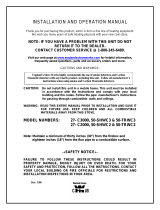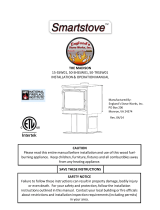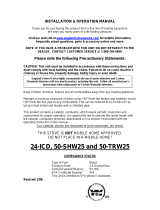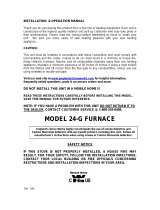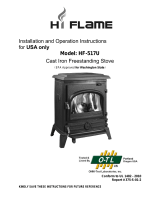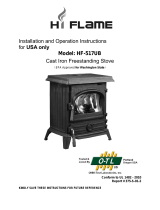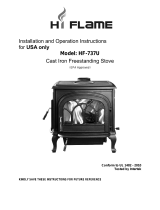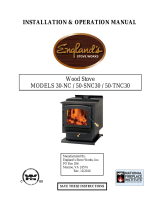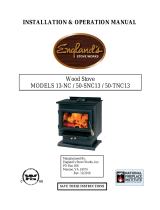
18
IMPORTANT: HELPFUL HINTS AND TIPS WORTH REVIEWING
1. What is the correct way to start a fire?
You will need small pieces of dry wood (kindling) and paper. Use only newspaper or paper
that has not been coated or that has had materials glued or applied to it. Never use coated
or colored paper (such as advertising flyers).
Open the door of the wood stove.
Crumple several pieces of paper, and place them in the center of the firebox, directly on
the firebricks of the stove. Never use a grate to elevate the fire.
Place small pieces of dry wood (kindling) over the paper in the form of a “teepee.” This
allows for good air circulation, which is important for good combustion.
Light the crumpled paper in two or three different locations. NOTE: It is important to heat
the air in the stovepipe for draft to begin.
Fully open the air control of the wood stove, and close the door until it is just slightly open,
allowing for air to be introduced into the firebox. Never leave the door fully open, as sparks
from the kindling may occur, causing injury. As the fire begins to burn the kindling, some
additional kindling may be needed to sustain the fire. DO NOT add more paper after the
fire has started.
Once the kindling has begun to burn, start adding some small pieces of seasoned, dry
firewood. NOTE: Adding large pieces at the early stages will only serve to smother the
fire. Continue adding small pieces of seasoned, dry firewood, keeping the door slightly
open until each piece starts to ignite. Remember to always open the door slowly when
placing wood into the fire.
Once the wood has started to ignite and the smoke has reduced, close the stove door fully.
(Reduction of smoke is a good indication that the draft in the chimney has begun, and
good combustion is now possible.) Larger pieces of seasoned, dry firewood can now be
added when there is sufficient space in the firebox. Adjust the air control setting to your
desired setting.
NOTE: The lower the air control setting, the longer the burn time of the firewood.
2. What type of wood is best to use as firewood?
Dry, seasoned hardwood should be used. Avoid green, unseasoned wood. Green wood,
besides burning at only 60% of the fuel value of dry seasoned wood, will deposit creosote
on the inside of the stove and along to inside of the chimney.
3. What does dry, seasoned wood mean, and what is considered to be hardwood?
Wood that has been dried for a period of one year in a well-ventilated and sheltered area is
considered dry, seasoned wood. Hardwoods generally come from slow-growth trees, such
as Oak or Fir. Softwoods generally come from fast-growth trees, such as Pine or Spruce.
4. Will following the steps listed above result in a perfect fire every time?
A good answer would be “most of the time.” There are many variables that can affect your
rate of success when starting a fire, and experience will teach you how to deal with the
variables. This section of the manual will cover some of the variables that can affect a fire,
and time and patience will contribute to your ability to start a good fire consistently.
5. Why can’t I get the fire lit?
Damp or wet wood and poor draft are the main reasons for poor results when starting a
fire. Remember to always use dry, seasoned wood for your fire. Even wood that has been
dried (seasoned) for a long period of time will be difficult to light if it has gotten wet.
6. Why is there always a large quantity of thick black smoke in the firebox?
A large quantity of thick black smoke in the firebox is a possible indication that you have
poor draft.
























